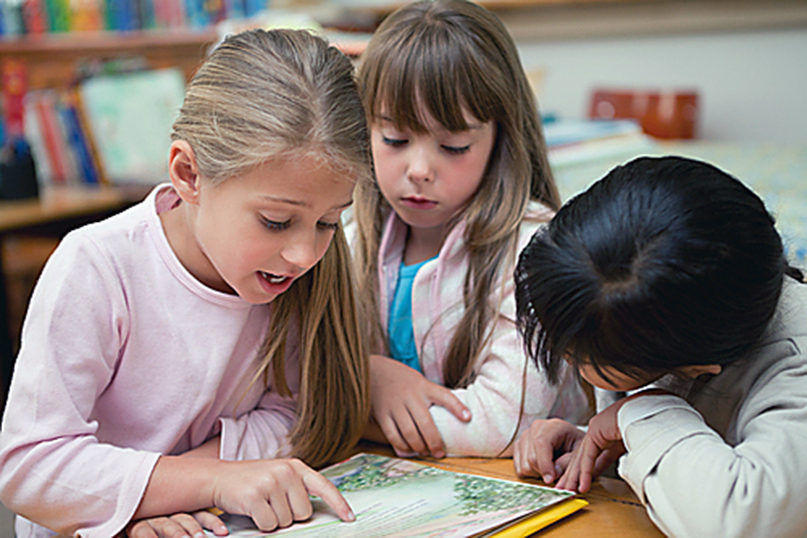
By Joyce Schriebman
I recently attended a one-day workshop for librarians on diversity in children’s literature. The day was billed as an “immersive, interactive day of learning… [teaching how] to recognize offensive stereotypes, tropes, and microaggressions within media and how to assess for authenticity and appropriation.”
I am not a librarian but a Jewish writer of children’s stories. I was one of four non-librarians in a room that was predominantly white and mostly female. And I was eager to hear what librarians had to say.
After a welcome from three facilitators, all professionals in the field of children’s literature, we explored our individual/multiple identities and discussed implicit biases, the history of racism in the U.S., and the lack of diversity in children’s literature and publishing. We used the Bennett Model of Cultural Competency to determine where on a scale—from Denial, Defense, and Minimization to Acceptance, Adaptation, and Integration—main actors of fictionalized scenarios landed. Questions and constructive pushback were encouraged.
Then we did an exercise called “Unpacking the Invisible Knapsack,” where we tallied points of personal privilege, or unearned advantages, that we’d earned through no effort of our own. This led to a conversation about benefits inherent in our ethnicity, class, gender, physical ability, sexual identity, and race.
The morning was professional, educational, and thorough.
And yet…
No one was talking about religion or religious diversity.
During a break, I questioned this omission and pointed out the risks of religious othering: the Muslim Ban, workplace discrimination, and the extraordinary rise of antisemitism and Islamophobia. I was told there were too many areas of diversity to cover everything in the morning session but that the topic would be addressed in the afternoon.
After lunch we did a deep dive into children’s literature, reviewing books using numerous categories of discrimination. We examined books through frames that included African Americans. Latinx. Muslims. Native Americans. Obesity. And neurodiversity. We talked about egregious depictions of slavery and other blunders in children’s classics.
As I waited for the category of Religion to be projected on the giant screen, I realized that the workshop had moved on. Presumably, organizers felt the single slide on Muslims constituted a discussion on religion!
But they were wrong.
We need to talk about religious discrimination and Christian privilege in literature. And the workshop’s one slide on Muslim stereotypes and Islamic media bias is not a discussion of religious diversity. There was a cursory mention of intersectionality but not the unique position that we, white Jews, find ourselves in.
The workshop continued, and I considered whether to raise the issue. Again. But as the day wound down, I felt there was little chance of having a constructive conversation around religious diversity, and I left the workshop disheartened.
I shared my experience with several online Jewish writers’ groups, and within 24 hours received more than 200 comments with examples of sidelining Judaism, Jewish stories, and Jewish experiences. The comments ranged from anger and frustration to empathy and a call to action. I don’t know what the collective response will be. But this is what I want.
I want religion and religious literacy to be included in conversations about diversity.
I want people in the room to know that Jews are less than 2% of the U.S. population yet experience 58% of religious hate crimes.
I want people in the room to know that when religious hate crimes rose 23%, hate crimes against Jews increased 37%.
I want people in the room to remember Tree of Life and Poway synagogues whenever they say Jews are protected by white privilege.
I want people in the room to know that roughly 15% of Jews living in the United States are Jews of color.
I want publishers and librarians to recognize that a more compassionate world means children’s books that are both mirrors and windows—reflecting our diversity and providing a broader worldview.
I want Jewish writers to create Jewish books that are not solely about the Holocaust or Jewish holidays.
And I want us to lift up each other and celebrate our differences.
Throughout the workshop, facilitators said, “When we know better, we do better.”
Now we know better. Let’s do better.
Joyce Schriebman is a writer, educator, interfaith advocate and founder of My Brother from Another Mother, an organization that promotes Jewish-Muslim engagement. She lives in Connecticut with her life-partner Yehezkel Landau, with whom she co-wrote the guide “How to Talk to Just About Anyone About Israel-Palestine.”







 Southern New England Jewish Ledger
Southern New England Jewish Ledger












